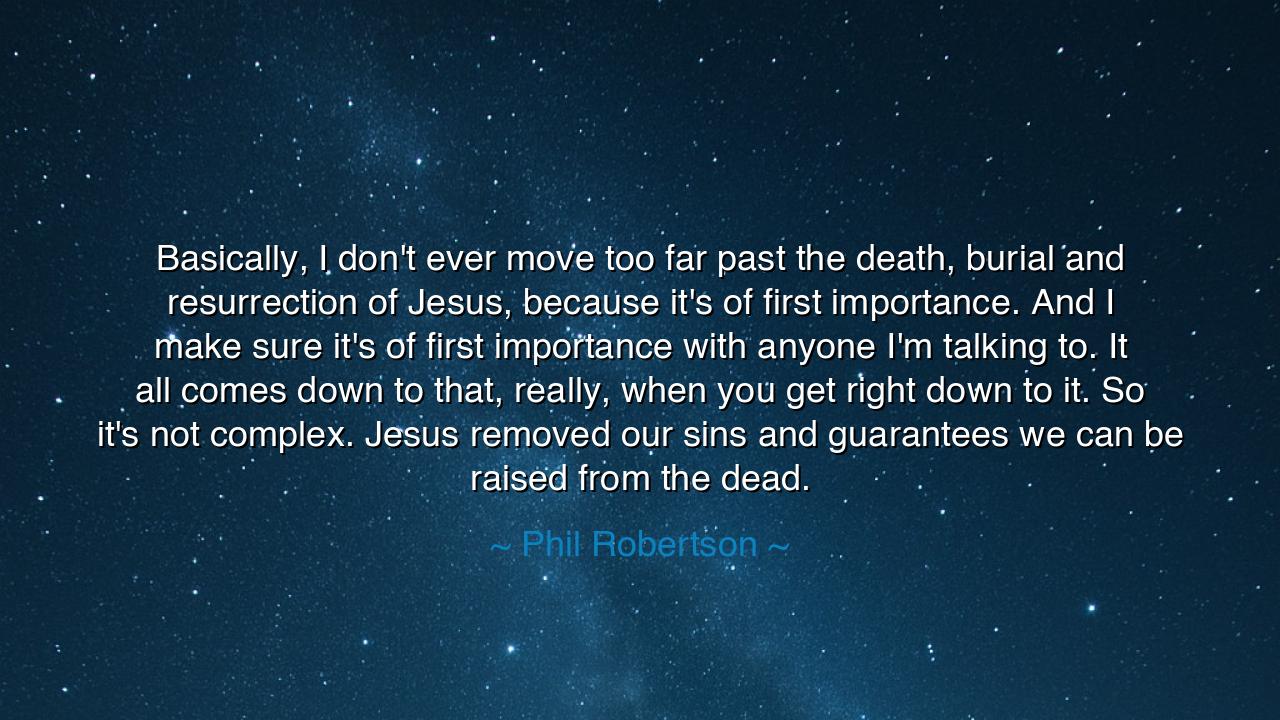
Basically, I don't ever move too far past the death, burial and
Basically, I don't ever move too far past the death, burial and resurrection of Jesus, because it's of first importance. And I make sure it's of first importance with anyone I'm talking to. It all comes down to that, really, when you get right down to it. So it's not complex. Jesus removed our sins and guarantees we can be raised from the dead.






“Basically, I don't ever move too far past the death, burial and resurrection of Jesus, because it's of first importance. And I make sure it's of first importance with anyone I'm talking to. It all comes down to that, really, when you get right down to it. So it's not complex. Jesus removed our sins and guarantees we can be raised from the dead.” — thus spoke Phil Robertson, the humble preacher and craftsman, whose words echo not with the pride of intellect but with the simplicity of revelation. In this declaration, he draws the listener back to the foundation of faith, to that central mystery upon which the entire Christian world stands — the death, burial, and resurrection of Jesus Christ. To Robertson, all the complexities of theology, philosophy, and doctrine dissolve before this one eternal truth: that in the act of divine love, sin was destroyed, death was conquered, and hope was restored.
The origin of this belief reaches to the heart of Scripture itself, to the words of the Apostle Paul in the first letter to the Corinthians: “For I delivered to you as of first importance what I also received: that Christ died for our sins according to the Scriptures, that He was buried, and that He was raised on the third day.” Robertson, echoing Paul, reminds us that the Christian message, though profound beyond comprehension, is not meant to be complicated. The mystery of salvation is not hidden behind ritual or hierarchy — it is laid bare in the life, death, and rising of the Son of Man. It is the beginning and the end of wisdom, the key that unlocks all human longing.
To say “I don’t move too far past it” is to proclaim that one’s entire life revolves around that sacred axis. It means that faith, at its purest, does not wander into prideful speculation or the vanity of endless questions, but remains rooted in gratitude and remembrance. For Robertson, and for all who walk the ancient path of faith, the cross is not a symbol of defeat, but the axis of eternity, where divine justice and divine mercy meet. It is where suffering is redeemed, where death loses its sting, and where the soul learns that love is stronger than the grave. In that moment of sacrifice, the world was remade — and to remember it daily is to live each day as one reborn.
Throughout the ages, the saints and sages have known this same truth. St. Francis of Assisi, who forsook riches and title, found peace not in elaborate theology but in the image of the crucified Christ. He called it “perfect joy” — not because it removed suffering, but because it gave suffering meaning. Like Robertson, he understood that the cross is not a relic of the past, but a living reality. It is the mirror in which man sees both his sin and his salvation, both his mortality and his immortality. To meditate on the death and resurrection of Jesus, then, is to look upon the truest reflection of love — love that dies so that others may live.
Robertson’s words also speak to the danger of forgetting simplicity in a world drunk on complexity. Many chase wisdom in the towers of philosophy, seek peace in wealth or power, or look for redemption in their own strength. But as Christ said, “Unless you become like little children, you shall not enter the kingdom of heaven.” It is not the proud who find God, but the humble — those who can say, “It all comes down to this: He died for me, and He lives again.” Such simplicity is not ignorance; it is clarity. It is the return to first principles, the stripping away of everything that distracts from the essential. To remember this is to walk through the chaos of the world with unwavering peace.
Consider the story of John Newton, the slave trader turned preacher, who once lived steeped in sin and violence. When at last he encountered grace, it was not through argument or philosophy, but through the revelation that Christ’s sacrifice was enough even for him. Newton’s conversion gave birth to one of the most enduring hymns in history — “Amazing Grace.” Like Robertson, Newton discovered that the heart of the gospel lies not in moral perfection or intellectual mastery, but in the surrender of the soul to the love that forgives and raises the dead. Through his testimony, we see how the simplest truth can transform even the hardest of hearts.
Therefore, O listener of tomorrow, take this teaching as a lamp for your path: do not move too far from what is of first importance. In your search for meaning, return always to the cross, to the empty tomb, to the hope that outlasts every shadow. Let this truth anchor you when the world’s wisdom fails — that Jesus removed our sins and opened the gates of life eternal. Live not in fear of death, for death itself has been conquered. Live not in the bondage of guilt, for grace has set you free. And when you speak, speak as Robertson speaks — not with complexity or pride, but with the quiet authority of one who has seen the truth and needs no other. For in the end, it all comes down to this: the Son of God died, was buried, and rose again — and because He lives, so shall we.






AAdministratorAdministrator
Welcome, honored guests. Please leave a comment, we will respond soon